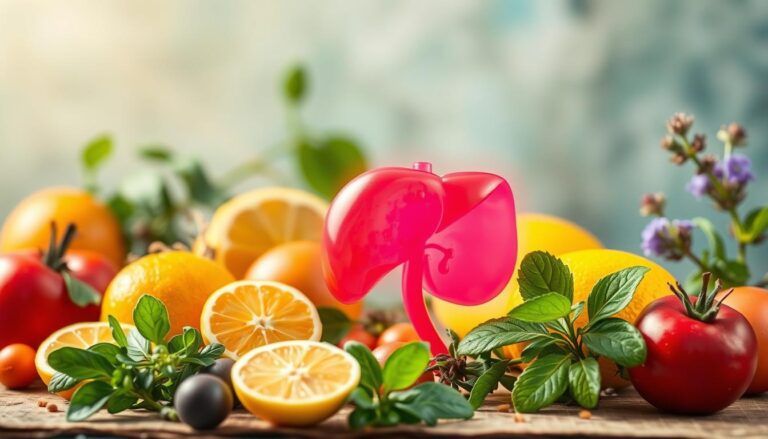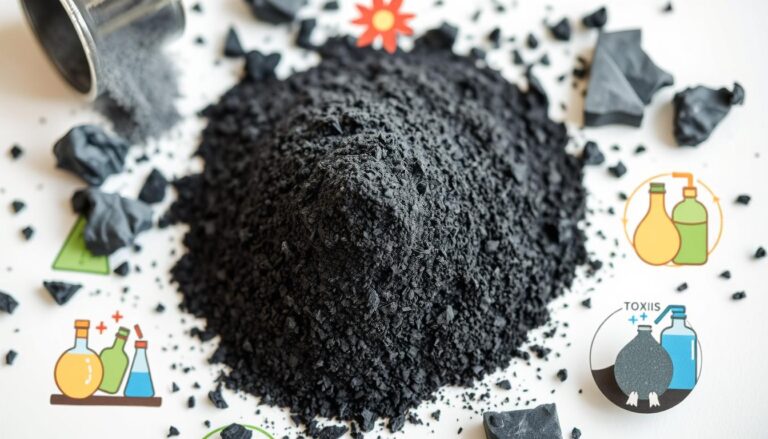Are you looking for the secret to building muscle? It’s right in your kitchen! Eating the right foods is key to growing strong lean muscles.
In this guide we’ll show you 20 foods that can help you reach your muscle building goals.
Key Takeaways
- Eating a balanced diet with protein, carbs, and fats is vital for muscle growth and recovery.
- Animal proteins like eggs, salmon, and lean meats have all the amino acids you need for muscle building.
- Plant proteins such as soy, quinoa, and legumes are also great for muscle building and offer more nutrients.
- Choosing the right carbs and fats is important for energy during workouts and muscle repair.
- Eating a variety of foods helps you get all the nutrients you need for muscle gain.
Understanding the Science of Muscle Building and Nutrition
Building muscle is more than just lifting weights. It also needs the right nutrition. Let’s explore how nutrition supports muscle growth and the key nutrients involved.
Role of Protein in Muscle Development
Protein is key for muscle growth and repair. Studies show eating 1.4–2 grams of protein for each kilogram of body weight daily is best for muscle building. Foods like chicken, lean red meat, and fish help with fat loss and muscle gain.
Importance of Carbohydrates and Fats
Carbohydrates give energy for muscle building workouts and aid in recovery. Healthy fats are important for hormone production, which helps muscles grow. A balanced diet with these nutrients is essential for health and muscle function.
Daily Nutritional Requirements for Muscle Growth
The daily protein intake for active people is 1.2 to 1.7 grams per kilogram of body weight. For a 150-pound person, that’s 95 to 136 grams of protein daily. A study also found 1.6 grams of protein per kilogram of body mass is best for muscle gain, or 109 grams for a 150-pound person.
For muscle building, a balanced diet is key. Focus on lean proteins, complex carbs, and healthy fats. Knowing the science behind muscle growth helps you optimize your diet and reach your body building goals.

Proper nutrition plays a crucial role in supporting muscle growth and development.
The Power of Complete Proteins Animal Based Sources
Building lean muscle depends on the quality of protein you eat. Animal proteins are top-notch because they have all nine essential amino acids. Foods like eggs, salmon, chicken, lean beef, and turkey are great. They not only offer high-quality protein but also important vitamins and minerals for muscle health.
Why Animal Proteins Are Essential
The body needs a mix of amino acids to work well. It can make 11 out of 20 amino acids but needs the other nine from food. Animal proteins, found in eggs, meat, and dairy, have all nine essential amino acids. This makes them perfect for building and keeping muscle.
Optimal Portion Sizes and Timing
Healthy adults need at least 0.36 grams of protein per pound of body weight daily. For someone who weighs 160 pounds, that’s about 57.6 grams of protein each day. It’s best to spread out protein intake, as the body can only absorb 25 to 40 grams at a time. A good serving size is about the palm of your hand.
Best Cooking Methods for Muscle Gain
Choosing the right cooking method is key for animal proteins. Grilling, baking, or broiling helps keep more protein and amino acids. Avoid deep-frying or overcooking to keep the protein quality high and prevent harmful compounds.
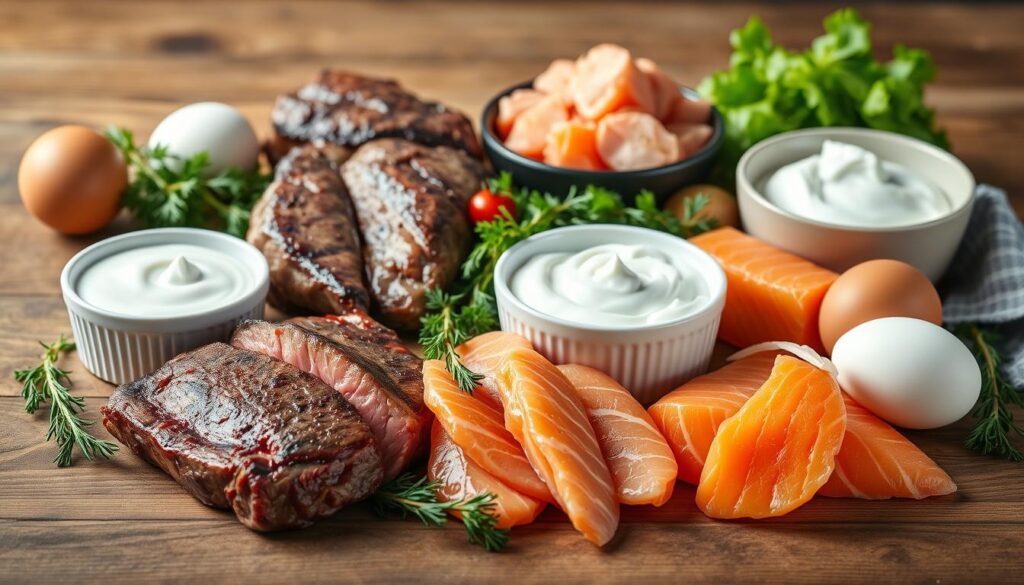
Read more: Maximize Muscle Gains with the Right Diet
Adding high-quality animal proteins to your diet is crucial for muscle growth. Combine these foods with regular exercise, and you’ll be on the path to reaching your lean muscle goals.
Plant Based Protein Sources for Muscle Growth
Looking to build muscle? Plant-based proteins are a great choice. They’re packed with amino acids and vitamins to boost your health and fitness.
Soybeans are a top pick. You can find them in edamame, tofu, or tempeh. They have up to 70% protein, just like meat and dairy. Quinoa, chickpeas, and lentils also offer a lot of protein, with 8-25 grams per cup.
Other great options include:
- Seeds and kernels like hemp, pumpkin, sesame, and chia, with 20-30 grams of protein per 100 grams.
- Nut butters like peanut butter, with about 25 grams of protein per 100 grams.
- Nutritional yeast, which has 5 grams of vegan protein per tablespoon.
- Oatmeal, with around 13 grams of protein per 100 grams.
If you’re vegetarian or vegan, mix these proteins to get all the amino acids you need. Vegan protein powders can also help increase your protein intake.
| Plant-Based Protein Source | Protein Content per 100g |
|---|---|
| Soybeans | Up to 70g |
| Quinoa cooked | 8g |
| Chickpeas cooked | 15g |
| Lentils cooked | 18g |
| Hemp Seeds | 20-30g |
| Peanut Butter | 25g |
| Nutritional Yeast | 5g per tablespoon |
| Oatmeal cooked | 13g |

Plant protein was found to be just as effective as animal protein for gaining lean muscle, according to research.
20 Foods to Eat to Gain Muscle
High Protein Animal Sources
To build lean muscle, you need a diet rich in high-quality protein. Animal sources like eggs, chicken breast, and lean beef are great. They have all the amino acids your muscles need to grow and repair.
For example, a 4-ounce chicken breast has about 26 grams of protein. One egg gives you 13 grams of this important nutrient.
Plant-Based Protein Options
Vegetarians and vegans can also build muscle with plant-based proteins. Foods like tofu, tempeh, and quinoa are full of protein. A 4-ounce tofu has 10 grams of protein, and a cup of cooked chickpeas has 12 grams.
Strategic Carbohydrate Choices
Carbs are key for your workouts and muscle recovery. Choose complex carbs like brown rice and whole wheat bread. They give you energy and are full of fiber, vitamins, and minerals.
| Food | Protein g per Serving |
|---|---|
| Chicken Breast | 26 |
| Tofu | 10 |
| Lean Beef | 21 |
| Greek Yogurt | 20 |
| Eggs | 13 |
| Tuna | 20 |
| Chickpeas | 12 |
| Salmon | 17 |
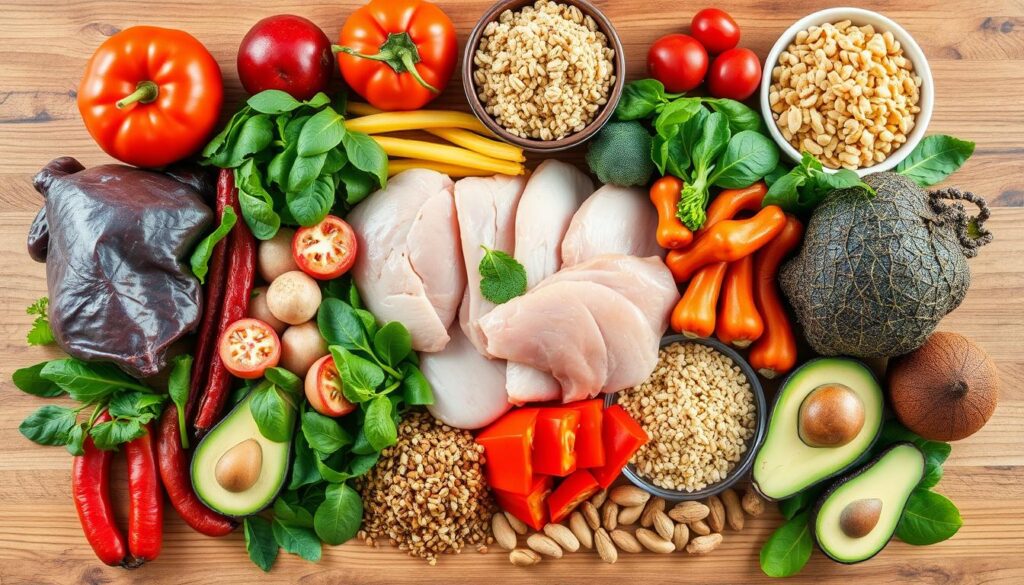
Adding a variety of muscle-building foods to your diet can help you reach your fitness goals. These 20 foods provide the necessary nutrients for muscle growth and recovery. They include animal proteins, plant-based options, and complex carbs.
Essential Dairy Products for Muscle Building
Dairy products are key for building muscle. They offer high-quality protein, carbs, and fats. This mix helps grow and repair muscles. Greek yogurt and cottage cheese are top picks for your diet.
Greek Yogurt: A Probiotic Powerhouse
Greek yogurt is great for athletes. It has more protein than regular yogurt, perfect after working out. It also has probiotics that help your gut health. This improves how your body absorbs nutrients and boosts your immune system.
Cottage Cheese: Slow-Release Protein
Cottage cheese is a muscle-building superstar. It has casein protein that your body digests slowly. This means it keeps providing amino acids for a long time. It’s great before bed or when you can’t eat for a while.
Milk: The Balanced Recovery Drink
Low-fat or skim milk is good after workouts. It has proteins and carbs that help your muscles recover. Studies show it can help your muscles grow more than other drinks.
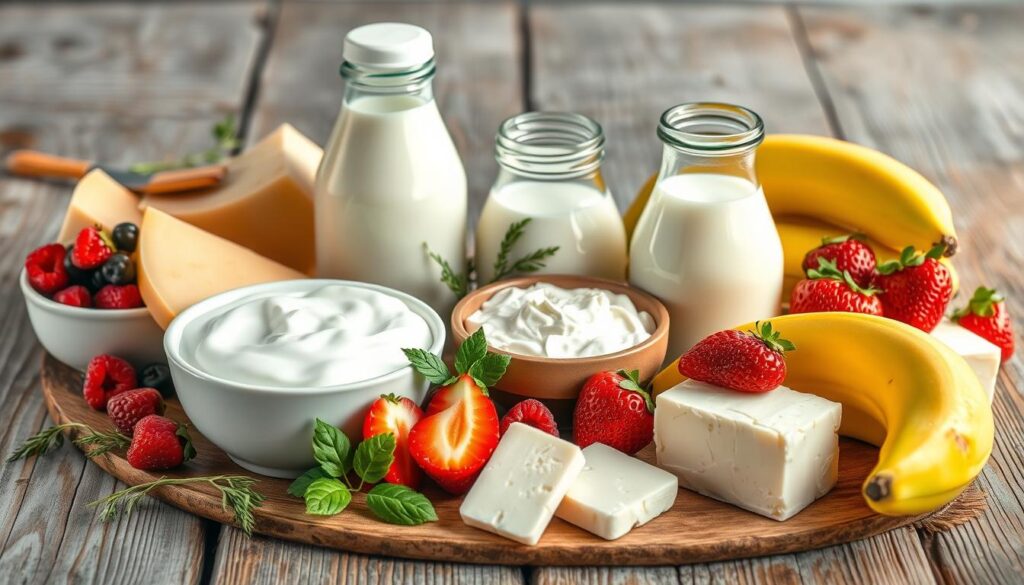
Read more: Fuel Your Muscles The Top Foods for Growth
Adding these dairy products to your diet can help you reach your fitness goals. Greek yogurt, cottage cheese, and milk offer unique benefits. They support muscle growth, recovery, and health.
Seafood Options for Lean Muscle Development
Seafood is a nutritional powerhouse for building lean muscle. It offers a wide range of protein-rich options. These can be a big help in any muscle-building plan.
Fatty Fish Benefits
Fatty fish like salmon and tuna are great for muscle building. They are full of protein and omega-3 fatty acids. These healthy fats can boost muscle mass and strength.
A 4-ounce serving of wild-caught salmon has about 20 grams of protein and lots of omega-3s. A 4-ounce can of tuna has 33 grams of protein. Both are perfect for increasing lean muscle mass.
Lean Seafood Choices
- Shrimp: A 3-ounce serving of shrimp has 17 grams of protein and very little fat. It’s great for those watching their calorie intake.
- Scallops: Scallops are lean, offering 24 grams of protein per 4-ounce serving.
- Tilapia: This white fish has 23 grams of protein and only 111 calories per 4-ounce fillet. It’s ideal for muscle building diets.
Choosing fatty fish or lean seafood can add valuable nutrients to your fitness and nutrition plan. They are packed with high-quality protein and essential nutrients.
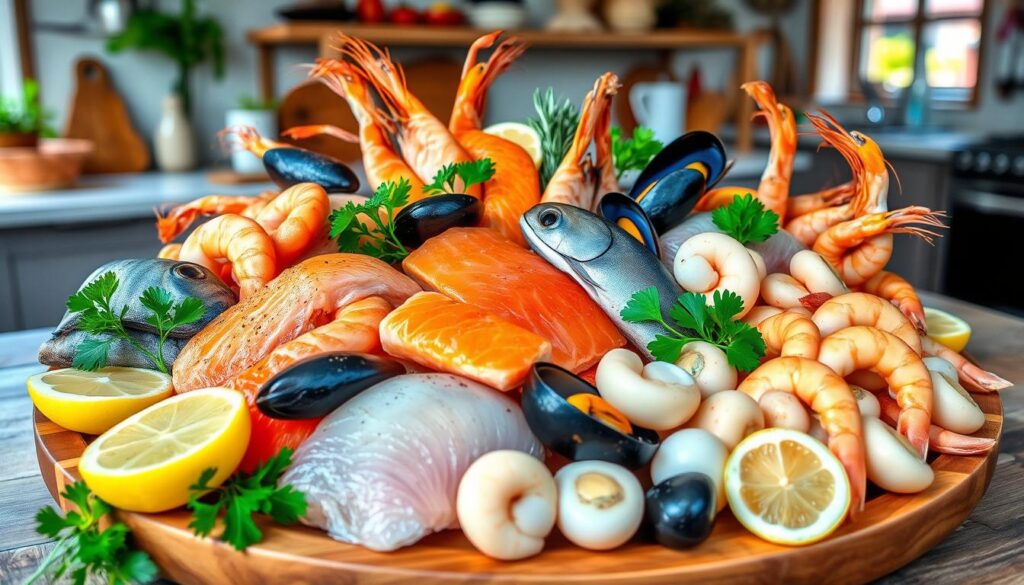
Read more: What to eat gain muscle at 50?
Seafood is an excellent source of protein, with most varieties containing 17-20 grams of protein per 3-ounce serving.
Strategic Carbohydrates for Energy and Recovery
Carbohydrates are key for your workouts and recovery. Choosing the right carbs gives you lasting energy and helps muscles grow. Adding the right carbs to your diet boosts your performance and recovery, leading to more muscle.
Great carbs for building muscle include quinoa, brown rice, oats, and buckwheat. These complex carbs give you energy and are full of fiber, vitamins, and minerals. Quinoa and buckwheat even have all the amino acids your muscles need.
Eating carbs before and after workouts is smart. It fills up glycogen stores, fuels your muscles, and helps you recover. This strategy makes your workouts better and helps you build more muscle over time.
| Carbohydrate Source | Carbohydrate Content per 200g |
|---|---|
| Quinoa | 40 grams |
| Brown Rice | 44 grams |
| Oats | 46 grams |
| Buckwheat | 42 grams |
Adding these carbs to your muscle building, nutrition, and fitness diet ensures you have energy and support for gaining muscle.
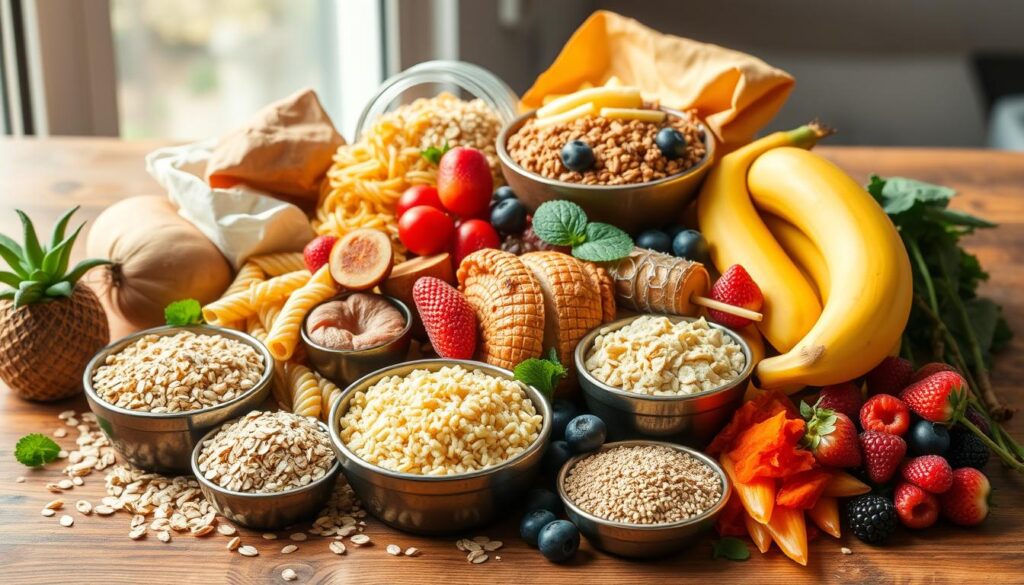
Carbohydrates are the primary fuel source for high-intensity exercise, and replenishing them after a workout is crucial for muscle recovery and growth.
Healthy Fats and Their Role in Muscle Growth
Healthy fats are key for building muscle. They help make hormones, lower inflammation, and give you energy for workouts. Adding the right fats to your diet can help you grow muscle and feel better overall.
Omega-3 Rich Foods
Omega-3 fatty acids are vital for muscle growth and health. Fatty fish, flax seeds, and walnuts are great sources. Eating these foods often can help your muscles recover and fight inflammation.
Beneficial Cooking Oils
Extra virgin olive oil is great for building muscle because of its healthy fats and antioxidants. Coconut oil and avocado oil also have healthy fats that help fuel your workouts and grow muscle.
Nuts and nut butters are full of protein and healthy fats. They’re good for your muscle-building diet. These foods give your body what it needs to build and keep lean muscle.
Healthy fats, such as those found in avocados, nuts, and olive oil, are essential for muscle growth and overall health. They support hormone production, reduce inflammation, and provide sustained energy for your workouts.
While fats are important for muscle building, don’t eat too much. Try to get 20-30% of your calories from fats. Focus on unsaturated and omega-3 rich fats. Adding these healthy fats to your diet will help you build the muscle you want.
Timing Your Meals for Maximum Muscle Gain
Getting your meal timing right is key for muscle building. Eating protein and carbs every 3-4 hours keeps your muscles growing and recovering well. Eating right before and after your workout can also boost your results.
Before your workout, eat a meal with 40 grams of protein, 30 grams of carbs, and 10 grams of fat. This meal, eaten about an hour before, fuels your workout and gets your muscles ready.
Right after your workout, have a meal with 6-8 ounces of lean protein and 1-2 cups of carbs. This meal helps refill your energy stores and aids in muscle recovery and growth.
During your workout, drink a mix of 10-20 grams of protein and 40-70 grams of carbs. This mix, in 1,000 ml of water, keeps your amino acid levels high to support muscle building.
Lastly, remember to drink plenty of water all day. Aim for about 9 cups women or 13 cups men of water daily.
| Meal | Protein | Carbs | Fat |
|---|---|---|---|
| Pre Workout | 40 grams | 30 grams | 10 grams |
| Post Workout | 6-8 ounces | 1-2 cups | – |
| Intra Workout | 10-20 grams | 40-70 grams | – |
By planning your meals and choosing the right nutrients, you can improve your muscle building. This helps you reach your fitness goals.
Combining Foods for Optimal Muscle Growth
Building muscle is more than just eating lots of protein. It’s about mixing different foods in the right way. This helps your body absorb nutrients better and supports muscle growth.
Chicken with brown rice is a great combo. Chicken has all the amino acids your muscles need. Brown rice gives you energy and helps your muscles recover. Together, they provide everything your muscles need to grow.
Salmon with quinoa is another good mix. Salmon has omega-3s, which help your muscles and reduce inflammation. Quinoa is a complete protein and a complex carb, perfect for muscle building and recovery.
For a plant-based option, try Greek yogurt with berries and nuts. Greek yogurt is a high-quality protein that’s easy to digest. Berries add antioxidants, and nuts provide healthy fats and more protein. This mix supports muscle growth and health.
Adding colorful fruits and veggies to your diet is key. They give you vitamins, minerals, and phytonutrients for muscle function and health. Eating 1 cup of nitrate-rich leafy greens daily is linked to 11% stronger leg strength.
| Muscle Building Meal Combinations | Protein Source | Carbohydrate Source | Additional Benefits |
|---|---|---|---|
| Chicken and Brown Rice | Complete Protein | Complex Carbohydrate | Sustained Energy, Muscle Recovery |
| Salmon and Quinoa | Omega-3 Rich Protein | Complete Protein and Complex Carbohydrate | Reduced Inflammation, Bone Health |
| Greek Yogurt, Berries, and Nuts | Dairy Protein | Antioxidants, Healthy Fats | Muscle Growth, Immune Support |
By mixing these foods, you can build muscle in a balanced way. This supports your fitness goals.
Proper nutrition, including the strategic combination of foods, is crucial for maximizing muscle growth and recovery.
Conclusion
Building muscle needs a mix of good nutrition, regular workouts, and sticking to it. The 20 foods in this guide are key for a muscle-building diet. They offer high-quality proteins, complex carbs, and healthy fats for building lean muscle.
It’s important to balance your diet, drink plenty of water, and adjust your eating plan as needed. This will help you meet your fitness goals.
Eating these nutrient-rich foods and following a workout plan can help you reach your muscle-building goals. For a diet plan that fits you, talk to a registered dietitian. They can make a nutrition plan just for you.
By eating the right foods and getting the right nutrients, you can reach your full potential. This will help you change your body in amazing ways.
Improving your nutrition and fitness is a journey. But with the right knowledge and effort, you can build the lean, strong muscles you want. Stay committed, make smart choices, and let these foods help you succeed.


